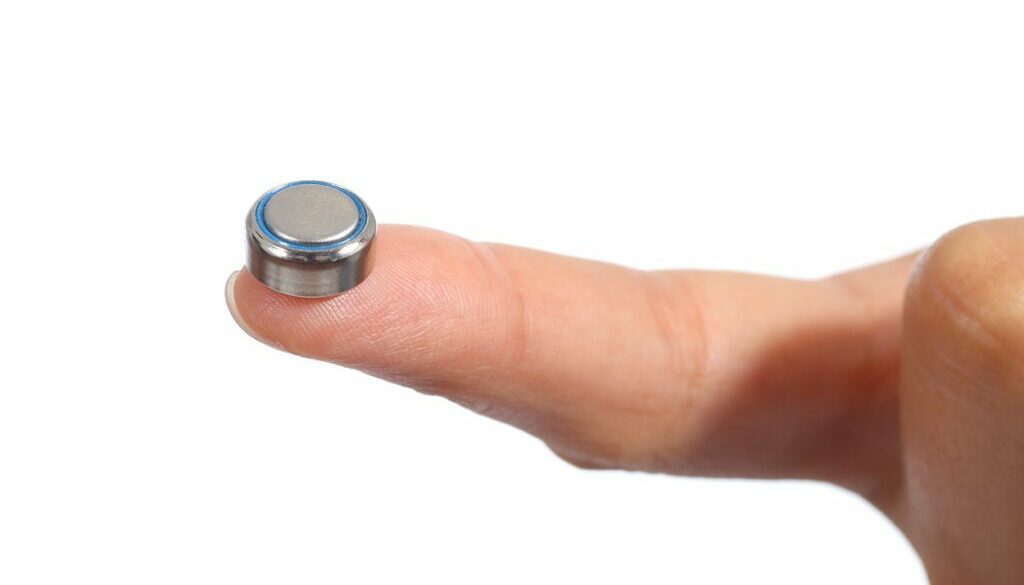Why Are Button Batteries Dangerous?
Toddlers and young children are ever exploring and experimenting with new things. The battle to keep objects out of their mouths seems never-ending. Lithium batteries, also known as “button” batteries, are bright, shiny, and enticing for kids. Since they are so small, button battery ingestion can easily happen, not to mention they also fit perfectly in a variety of other places like ears, noses, and even under eyelids.
Although they are tiny, button batteries can cause serious harm to your child. CMC Pediatrics wants you to know how you can avoid these types of injuries and also how you can immediately take action if you suspect your child has ingested one.
What happens when a button battery is ingested?
When small batteries get wet from saliva, water, or other bodily fluids, the electrical current in the battery turns the liquid into a corrosive product that can burn through parts of the digestive system.
You might think that could take some time to happen but that’s definitely not the case. These small batteries can burn through the first layer of the esophagus and destroy the tissue in the upper digestive tract within a few hours. The damage can happen very quickly and is likely to be worse if the battery gets stuck in the throat or esophagus instead of moving to the stomach. Within this time frame, it can cause serious injuries and even lead to death.
While not as serious as ingestion, lithium batteries stuck in an ear or nose can cause significant injuries too, such as perforation of the nasal septum or the eardrum, hearing loss, or facial nerve paralysis.
See how a button battery can burn through tissue
What are button batteries used for?
Visits to the emergency room as a result of battery-related injuries have more than doubled in the last 10 years over the previous decade. Button batteries are generally used in portable devices that are found throughout the home. If it’s small, electronic, and doesn’t plug into the wall, it probably uses a button battery.
Some common household objects that might use these batteries are:
- children’s toys
- flashing novelties like flameless candles
- remote controls
- thermometers
- car keys
- watches
- calculators
- musical greeting cards
- Glucometers
- hearing aids
- reading lights

What should parents do?
CMC Pediatricians stress that prevention is key to avoiding these types of accidents. Don’t change or handle batteries in front of your kids. Shiny objects are attractive so don’t give them the idea in the first place.
Get rid of your expired batteries immediately. Even old batteries have enough charge left to be dangerous. Make sure you store all your extra batteries in a secure place, well out of the reach of children.
Choose toys and products with battery compartments that have child-resistant locking mechanisms. This might be a compartment that needs a screwdriver to open it. Some products include a compartment that requires 2 simultaneous movements to open, like pressing a button while sliding another component. It’s always a good idea to add a second layer of protection by covering these areas with duct tape.
What to do if I think my child swallowed a battery?
Time is of the essence. Seek immediate medical attention by first calling the National Battery Ingestion Hotline at 800-498-8666. In most cases, an x-ray will be needed to determine where the battery is located. If it remains in the esophagus, it will have to be removed immediately.
It’s very important that you don’t induce vomiting because this can cause the battery to become lodged in the esophagus or other vulnerable surrounding areas. Batteries that become “hung up” are the ones that cause the most problems.
Can honey help?
Although you don’t want your child to eat or drink anything until an x-ray determines where the button is located, some research has demonstrated that eating honey after swallowing a button battery has the potential to reduce serious injuries in small children. Ingesting a couple of teaspoons of honey at regular intervals as you make your way to the hospital can act as a protective coating around the battery and is useful for preventing the progression of injury.

Understand that ingesting honey after swallowing a button battery does not mean that injury will not occur. Immediate medical treatment is still needed. Call the National Battery Ingestion Hotline and visit your nearest emergency room.







